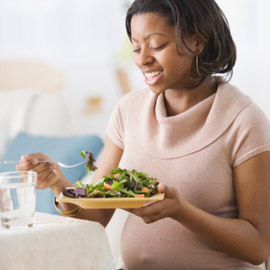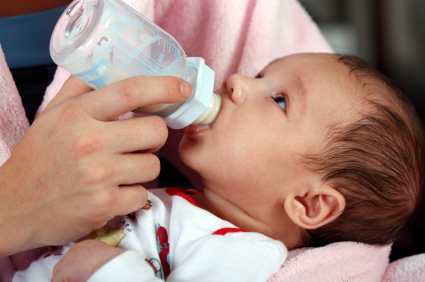(Note: This is the first post in a series.)
None of us can remember our very first family dinners. I’m thinking about the meals we had in the dark, cozy confines of the womb, swallowing the flavors of chicken curry or matzoh ball soup, or whatever our mother had eaten for dinner. There is intriguing research suggesting that a mother’s diet during pregnancy predicts a baby’s first food preferences and that openness to new tastes begins before birth. In other words, what our mothers eat during pregnancy makes us predisposed to liking the same flavors once we are infants trying our first baby food. A study in the medical journal Pediatrics reports that babies who had repeated exposure to carrot juice during the last trimester of pregnancy had positive facial expressions when they first tried carrot-flavored cereal – “Oh, yeah, I remember this yummy taste.”
 The wider the range of foods the pregnant mother eats, the more foods the baby will later recognize. My craving for chopped chicken liver sandwiches during my first pregnancy may account for my first son’s passion for corn beef with chicken livers; likewise, my avoidance of fish because it made me feel queasy during my second pregnancy may explain my younger son’s distaste for most fish dishes. The foods that a mother eats during pregnancy not only sustain the fetus, they may also influence the child’s receptivity to those foods.
The wider the range of foods the pregnant mother eats, the more foods the baby will later recognize. My craving for chopped chicken liver sandwiches during my first pregnancy may account for my first son’s passion for corn beef with chicken livers; likewise, my avoidance of fish because it made me feel queasy during my second pregnancy may explain my younger son’s distaste for most fish dishes. The foods that a mother eats during pregnancy not only sustain the fetus, they may also influence the child’s receptivity to those foods.
The mother’s role as shaper of her baby’s palate continues during breast-feeding, since mother’s milk takes on the flavors of the food she eats. She creates a bridge from what she eats to what her baby tastes. Since children tend to prefer foods that are familiar, the flavors that babies taste as infants will likely influence the foods that they gravitate to when they are offered those same foods in solid form. It appears that preferences for certain cultural foods get laid down during pregnancy and breast-feeding.
Far more important than developing a robust eater, and regardless of whether your baby is bottle- or breast-fed, the feeding relationship is the first crucial task of parenting. When feeding is warm and consistent, it creates a building block for later feelings of attachment. Babies learn that they can count on you to take care of their needs. And, since feeding is a reciprocal process, it is the first place that babies learn about their impact on you. When he cries, he can get you to feed him. Through a predictable, reliable feeding experience, your baby will learn that the world is a safe place.

There are many behaviors that help your baby to enjoy food and eating: looking at your baby, holding your baby securely, letting her decide when to eat, how much to have and when to stop – and all this without a lot of interruptions to wipe or burp her. Once your child is about six months, it is important to let him decide how much to eat and to self-feed. It’s a positive experience for your child to get messy (though less fun for the cleaner-upper). While he’s making his food into a train track with locomotives going across his high chair, talk to him in a quiet and encouraging manner. But this is only the first opportunity to make eating enjoyable– there will be lots of other points along the way to direct the train towards a satisfying family dinner.
Sources:
Mennella, J., Jagnow, M., and Beauchamp, G. (2001) Prenatal and postnatal flavor learning by human infants. Pediatrics, 107, no. 6: 88-94.
Beauchamp, G, and Menella, J (2009) Early flavor learning and its impact on later feeding behavior. Journal of Pediatric Gastroenterology and Nutrition, 48, 25-30 (accessed on 11/26/2010: https://journals.lww.com/jpgn/Fulltext/2009/03001/Early_Flavor_Learning_and_Its_Impact_on_Later.5.aspx

 Anne Fishel is an Associate Clinical Professor of Psychology at the Harvard Medical School and the Director of the Family and Couples Therapy Program at Massachusetts General Hospital. She has lectured and written about the benefits of family meals.
Anne Fishel is an Associate Clinical Professor of Psychology at the Harvard Medical School and the Director of the Family and Couples Therapy Program at Massachusetts General Hospital. She has lectured and written about the benefits of family meals.